Doing research: What say us the Apostle’s Acts and Saint Paul’s letter to Philippians about Philips and its inhabitants?
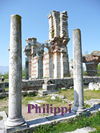
Doing research: What say us the Apostle’s Acts and Saint Paul’s letter to Philippians about Philips and its inhabitants?
|
|
The idea of this article is that students could learn history through documents, they will be able to consult the original sources and they will be historians. The task here is to get some information of the biblical texts.
1-Placing us in the space and the time
Paul’s first visit to Philippi was during his second apostolic journey. Paul with Silas and Timothy arrived in Philippi about 50 A.D. through the via Egnatia, which linked Byzantium with the Adriatic sea. The journey is told in the Apostle’s Acts book (Acts), written after 70 A. D.
The letter to the Philippians ( Fl) was written by Paul from the prison, it’s thought, in Efes, between 56/57year A. D.
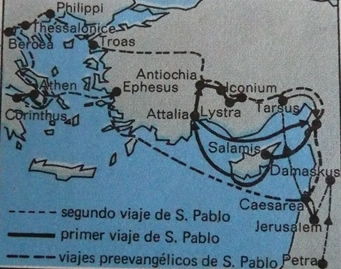
First journey (primero) and second journey (segundo)
2- We start the research
2-1 Philippi a city in the Roman Empire
It is said that Philippi was a roman colony, a city of the first district of Macedonia:
From Troas we put out to sea and sailed straight for Samothrace, and the next day on to Neapolis. From there we travelled to Philippi, a Roman colony and the leading city of that district of Macedonia. And we stayed there several days. Acts 16,11-12
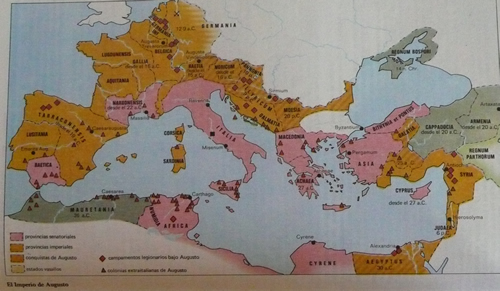
Roman empire. First century A.D.
In the roman colony of Philippithere was a fortune-teller that recognizes Paul and his mates as the highest God servants and as advertisers the way of the salvation:
Once when we were going to the place of prayer, we were met by a slave girl who had a spirit by which she predicted the future. She earned a great deal of money for her owners by fortune-telling. This girl followed Paul and the rest of us, shouting, "These men are servants of the Most High God, who are telling you the way to be saved." Acts 16,16-17
Paul preaches come into trouble with the roman rules and religion:
- It’s said that they are Jewish ant they disturb their city
- The Philippians mutiny against them
- The magistrates ordered to be stripped beaten and flogged
- They were put in prison
They brought them before the magistrates and said, "These men are Jews, and are throwing our city into an uproar by advocating customs unlawful for us Romans to accept or practice." The crowd joined in the attack against Paul and Silas, and the magistrates ordered them to be stripped and beaten. After they had been severely flogged, they were thrown into prison, and the jailer was commanded to guard them carefully. Upon receiving such orders, he put them in the inner cell and fastened their feet in the stocks. Acts 16,20-24
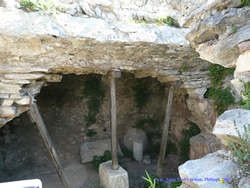
Philippi, place called St Paul’s Prison
Paul a roman citizen, the roman citizens were treated in different way in front of the law. Paul and Silas let know that they are roman citizens:
The jailer told Paul, "The magistrates have ordered that you and Silas be released. Now you can leave. Go in peace." But Paul said to the officers: "They beat us publicly without a trial, even though we are Roman citizens, and threw us into prison. And now do they want to get rid of us quietly? No! Let them come themselves and escort us out." The officers reported this to the magistrates, and when they heard that Paul and Silas were Roman citizens, they were alarmed. They came to appease them and escorted them from the prison, requesting them to leave the city. After Paul and Silas came out of the prison, they went to Lydia's house, where they met with the brothers and encouraged them. Then they left. Acts 16, 36-40
The palace guard is the residence of a provincial’s governor
Now I want you to know, brothers, that what has happened to me has really served to advance the gospel. As a result, it has become clear throughout the whole palace guard and to everyone else that I am in chains for Christ. Fl 1, 12-13
Paul shows a great deal as supporter to Caesar’s household
All the saints send you greetings, especially those who belong to Caesar's household. Fl 4, 22
2-1 The Christian community of Philippi
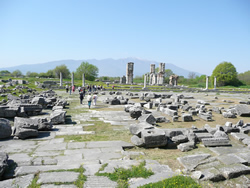 |
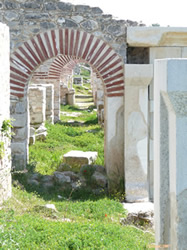 |
Philippi
It seems that women have a main role in diffusion of gospel:
From there we travelled to Philippi, a Roman colony and the leading city of that district of Macedonia. And we stayed there several days. On the Sabbath we went outside the city gate to the river, where we expected to find a place of prayer. We sat down and began to speak to the women who had gathered there. One of those listening was a woman named Lydia, a dealer in purple cloth from the city of Thyatira, who was a worshiper of God. The Lord opened her heart to respond to Paul's message. When she and the members of her household were baptized, she invited us to her home. "If you consider me a believer in the Lord," she said, "come and stay at my house." And she persuaded us. Acts 16,12-15
I plead with Euodia and I plead with Syntyche to agree with each other in the Lord. 3Yes, and I ask you, loyal yokefellow, help these women who have contended at my side in the cause of the gospel, along with Clement and the rest of my fellow workers, whose names are in the book of life. Fl 4,2-3
It is an active community in the Christianity expansion
Philippi was the first European city where Paul preached
I always pray with joy because of your partnership in the gospel from the first day until now. Fl 1,5
After 6 or 7 years staying Paul in Philippi, when he writes the letter, Philippians had formed an organised Christian community since he speaks about the overseers, traditionally bishops, and deacons:
Paul and Timothy, servants of Christ Jesus, To all the saints in Christ Jesus at Philippi, together with the overseers and deacons. Fl 1,1
The community shows solidarity with Paul’s evangelisation task, helping him with his material necessities. It is the only from which Paul accepted his help.
Moreover, as you Philippians know, in the early days of your acquaintance with the gospel, when I set out from Macedonia, not one church shared with me in the matter of giving and receiving, except you only; for even when I was in Thessalonica, you sent me aid again and again when I was in need. Fl 4,15-16
We have already known Lydia, Euodia, Syntiche, Sizik and Clement but Epaphroditus, Paul’s collaborator, is another member of the Christian community of Philippi. He went to the prison where Paul was to give him the Philippians help.
I have received full payment and even more; I am amply supplied, now that I have received from Epaphroditus the gifts you sent. They are a fragrant offering, an acceptable sacrifice, pleasing to God. Fl 4,18
But I think it is necessary to send back to you Epaphroditus, my brother, fellow worker and fellow soldier, who is also your messenger, whom you sent to take care of my needs. For he longs for all of you and is distressed because you heard he was ill. Fl 2, 25-26
And Timothy, who is the most understanding with Paul, and is the one who worries more by Christian community of Philippi
I hope in the Lord Jesus to send Timothy to you soon, that I also may be cheered when I receive news about you. 20I have no one else like him, who takes a genuine interest in your welfare. Fl 2,19-20
2-3 Paul’s advices to the Christian community of Philippi
Love to God and Christ Jesus as a source of the wisdom and as a guide in the decisions:
And this is my prayer: that your love may abound more and more in knowledge and depth of insight, 10so that you may be able to discern what is best and may be pure and blameless until the day of Christ, 11filled with the fruit of righteousness that comes through Jesus Christ—to the glory and praise of God. Fl 1,9-11
To fight all together in the gospel’s defence:
Whatever happens, conduct yourselves in a manner worthy of the gospel of Christ. Then, whether I come and see you or only hear about you in my absence, I will know that you stand firm in one spirit, contending as one man for the faith of the gospel
Paul’s shows them as a model:
since you are going through the same struggle you saw I had, and now hear that I still have. Fl 1,30
Join with others in following my example, brothers, and take note of those who live according to the pattern we gave you. Fl 3,17
Love ones to others, without selfish ambition and vain but in humility and generosity:
…then make my joy complete by being like-minded, having the same love, being one in spirit and purpose. 3Do nothing out of selfish ambition or vain conceit, but in humility consider others better than yourselves. 4Each of you should look not only to your own interests, but also to the interests of others. Fl 2,2-5
Obedience, fear and respect to arrive to the perfection and finally the salvation:
Therefore, my dear friends, as you have always obeyed—not only in my presence, but now much more in my absence—continue to work out your salvation with fear and trembling, for it is God who works in you to will and to act according to his good purpose.
Do everything without complaining or arguing, so that you may become blameless and pure, children of God without fault in a crooked and depraved generation, in which you shine like stars in the universe. Fl 2,12-15
To be vigilant with Jewish, they trust of a human title ( the rabbi?) while Christian community are driven by God’s spirit:
Watch out for those dogs, those men who do evil, those mutilators of the flesh. For it is we who are the circumcision, we who worship by the Spirit of God, who glory in Christ Jesus, and who put no confidence in the flesh. Fl 3,2-3
Although he is Jewish by birth:
If anyone else thinks he has reasons to put confidence in the flesh, I have more: circumcised on the eighth day, of the people of Israel, of the tribe of Benjamin, a Hebrew of Hebrews; in regard to the law, a Pharisee; as for zeal, persecuting the church; as for legalistic righteousness, faultless. Fl 3, 4-6
Heaven citizens, to undervalue the body desires and the things from the Earth:
Join with others in following my example, brothers, and take note of those who live according to the pattern we gave you. For, as I have often told you before and now say again even with tears, many live as enemies of the cross of Christ. Their destiny is destruction, their god is their stomach, and their glory is in their shame. Their mind is on earthly things. But our citizenship is in heaven. And we eagerly await a Savior from there, the Lord Jesus Christ, who, by the power that enables him to bring everything under his control, will transform our lowly bodies so that they will be like his glorious body. Fl 3, 17-21
Live always happy in the Lord:
Rejoice in the Lord always. I will say it again: Rejoice! Fl 4, 4
Show interested for whatever is true, noble, right, pure, lovely and admirable:
Finally, brothers, whatever is true, whatever is noble, whatever is right, whatever is pure, whatever is lovely, whatever is admirable—if anything is excellent or praiseworthy—think about such things. Fl 4, 8
3- Activities to work with students:
An interesting activity will be to present to the students some of the news that we have found about Philippi and they were capable of looking for their in the two Bible texts.
1- To present the activity.
2- To make hypothesis about what they expect to found
3- Each student choose which new wants to look for:
4- To contrast hypothesis against facts
5- Students evaluate the research process
6- Reflection, some ideas:
- Thinking about nowadays validity of the moral advices that Paul spread
- Coexistence between different communities: Roman, Jewel and Christian
- The important women’s role in the beginning of Christianity
Sources:
Bible: New International Version
Kinder, H. and Hilgeman, W.: Atlas histórico mundial, ed. ISTMO, 1986
Article made by Núria Petit